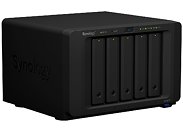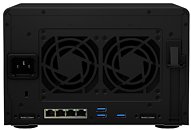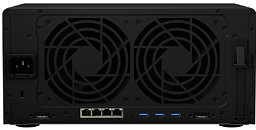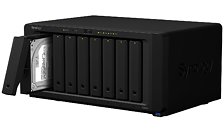Friday, April 14th 2017

Synology Introduces DiskStation DS1517+, DS1817+, and Expansion Unit DX517
Synology Inc. launched DiskStation DS1517+ and DS1817+ together with the Expansion Unit DX517 today. These powerful and scalable 5-bay and 8-bay tower servers offer a high-performance, reliable, and versatile network-attached storage solution for tech enthusiasts and small/medium-sized businesses. The exciting new feature in DS1517+ and DS1817+ is the inclusion of a PCIe slot, which allows users to install an optional 10GbE network interface card or Synology's new M2D17 M.2 SATA SSD adapter. In addition, DS1517+ and DS1817+ both come in 2GB and 8GB memory configurations, which can be upgraded to 16GB thanks to the easily accessible memory compartment.
Installing an additional network interface card allows enthusiasts and businesses to take advantage of up to two 10GbE ports to boost maximum throughput. When combined with the Intel Atom quad-core 2.4GHz processor and equipped with optional dual channel memory, DS1517+ and DS1817+ can deliver sequential throughput performance up to 1,179 MB/s reading and 542 MB/s writing speeds. With the introduction of Synology's new M2D17 PCIe adapter card, DS1517+ and DS1817+ can be equipped with dual M.2 SATA SSDs, allowing users to enhance performance and latency using SSD caching without occupying the front drive bays."DS1517+ and DS1817+ offer tech enthusiasts and small businesses more storage options that bring outstanding performance and flexibility for intensive storage tasks," said Jason Fan, Product Manager at Synology Inc. "DS1517+ and DS1817+ are Synology's first two NAS supporting M.2 SSD, designed to solve the performance bottleneck for heavy workload applications and significantly reduce the I/O latency."
Both DS1517+ and DS1817+ support connecting up to two DX517 expansion units, allowing users to add up to 10 additional drive bays and scale up storage capacity on-the-fly. The RAID volume can be expanded without having to reformat the existing hard drives, ensuring seamless capacity expansion without downtime.
DS1517+ and DS1817+ are powered by DiskStation Manager (DSM) 6.1, the versatile and intuitive operating system for Synology NAS devices. Featuring a wide range of applications for backup, network management, and productivity, DS1517+ and DS1817+ can serve an integral role in office IT infrastructure. Synology has received numerous media accolades, such as topping the mid-range NAS category in TechTarget's storage solution survey.
DS1517+ and DS1817+ both carry 3-year limited warranties.
For more information, visit the product pages of the DS1517+, DS1817+, DX517, and M2D17.
Installing an additional network interface card allows enthusiasts and businesses to take advantage of up to two 10GbE ports to boost maximum throughput. When combined with the Intel Atom quad-core 2.4GHz processor and equipped with optional dual channel memory, DS1517+ and DS1817+ can deliver sequential throughput performance up to 1,179 MB/s reading and 542 MB/s writing speeds. With the introduction of Synology's new M2D17 PCIe adapter card, DS1517+ and DS1817+ can be equipped with dual M.2 SATA SSDs, allowing users to enhance performance and latency using SSD caching without occupying the front drive bays."DS1517+ and DS1817+ offer tech enthusiasts and small businesses more storage options that bring outstanding performance and flexibility for intensive storage tasks," said Jason Fan, Product Manager at Synology Inc. "DS1517+ and DS1817+ are Synology's first two NAS supporting M.2 SSD, designed to solve the performance bottleneck for heavy workload applications and significantly reduce the I/O latency."
Both DS1517+ and DS1817+ support connecting up to two DX517 expansion units, allowing users to add up to 10 additional drive bays and scale up storage capacity on-the-fly. The RAID volume can be expanded without having to reformat the existing hard drives, ensuring seamless capacity expansion without downtime.
DS1517+ and DS1817+ are powered by DiskStation Manager (DSM) 6.1, the versatile and intuitive operating system for Synology NAS devices. Featuring a wide range of applications for backup, network management, and productivity, DS1517+ and DS1817+ can serve an integral role in office IT infrastructure. Synology has received numerous media accolades, such as topping the mid-range NAS category in TechTarget's storage solution survey.
DS1517+ and DS1817+ both carry 3-year limited warranties.
For more information, visit the product pages of the DS1517+, DS1817+, DX517, and M2D17.




16 Comments on Synology Introduces DiskStation DS1517+, DS1817+, and Expansion Unit DX517
Won't this mean these will also have the Atom C2000 clock flaw that prevents booting of a device once the CPU degrades?
www.theregister.co.uk/2017/02/06/cisco_intel_decline_to_link_product_warning_to_faulty_chip/
Heck, even the newest Atom platform would have been an improvement over just throwing in the same quad-core they've been using for years now. It doesn't even have to do with the errata, which was already fixed in the new stepping. But it's just stagnant hardware.
Aaaand no mention if NVMe SSD is supported in new pcie slot...guessing not otherwise they would have mentioned it.
I'm going to be really negative now - Sorry Synology -for around the 950 dollar/pounds/euro mark this is not good enough. A USB 3 port on the front and a pcie slot doesn't deserve skipping a model generation number, while using a four year old processor. Disappointing. QNAP has better products in my eyes. And they have proper virtualization, HDMI, 4 free camera surveillance licences (Syno =2) and other things I am sure. Quasi rant over.
edit: I was slow to post - Solidstate said most of what I was thinking.
Unless you are using a bootleg copy of Windows, and value your time at less than $5 per hour, you'd be hard pushed to build a WinNAS system with these features and still be cheaper. I've retired W2K3 servers to Rackstations. Very easy to set up, very easy to sync/replicate each other, private cloud, webserver, email server, very easy to administer.
If you are using a NAS as ONLY a local network drive, then yes, I agree with you. But if you want to use any of the other features they are well worth it. Check out Synology DSM features if you are unsure what they can do...www.synology.com/en-global/dsm/6.1/features and www.synology.com/en-global/dsm/app_packages
Not to mention that iX pulled the Corral OS just recently and the head developer of FreeNAS 10 up and left so all that work that they put into 10 just went out the window and they are still reportedly having major issues in certain areas of the new OS and are telling everyone to revert back to FreeNAS 9.10 and they are going to plug new features into 9.10 and call it 9.10.3.
So for me, it was roughly pay more for new parts because I needed ECC support and didnt want to risk my data, or spend $765 on a Synology with a 4GB ram upgrade to it and make it everything I need it to be.
add to that the pitiful speeds these "prosumer" NAS are capable of and most people on TPU should be building their own NAS.
As an example, my private server has 5 x 4 TB disks in raid 6.
It will saturate a Gbit LAN connection on bulk file transfer.
the hardware, in Norway with 25% VAT and what equates to 5 years warranty on ALL hardware was the equivalent of $400.
Show me a 8 bay NAS that can preform at the same level and be made quiet at the same time, please.
1515+ is old and has CPU problems so I didn't decide on it, 916+ looks expensive to me for what it offers...
I want to use it as a DAS too so 10GbE would be nice but unlike QNAP Synology lacks it and I hoped that new 151X will have it, but no, and I will not pay another €€€ for expansion card.
Besides that 1517+ have nothing new to offer beside expansion slot...
Sadly but it looks like I will choose QNAP 531X which is a great deal compared to 916+/1517+....
DSM is - in my opinion - way ahead of qnap. Unfortunately synology is aware of this, and price their hardware accordingly.
when my DS412+ bit the dust, due to a bad outcome of an attempted ram upgrade i bought a ds916+ - have never regretted it.
the ONLY thing i needed to do, was to configure my static ip again. everything else worked out of the box - even my virtual machines (dockers), dvb link and my surveilance station setup (6 cams)
The DS1815+ went for 850 dollars completely empty. And the hardware it had when it first came out was fine for what it was, and the price bracket it competed in against the likes of QNAP and such. But to not update to the new Atom platform, or a Celeron, or anything after several years is inexcusable. I only wish other companies began offering btrfs as options, because right now, Synology is the only major vendor that offers a resilient file system.